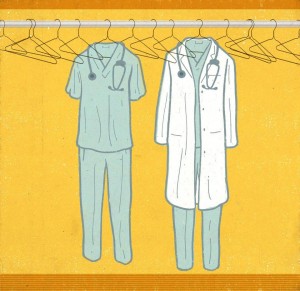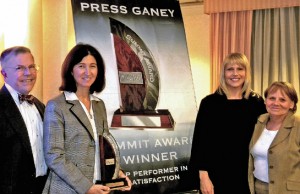When All You Have Is A Hammer: The Problem With Outsourcing Primary Care To Non Physicians

Image Credit: Dan Page, Boston Globe
What is the US going to do about our current and future primary care physician shortage? Many believe that the solution is to expand the scope of nursing practice, and license non-physicians (such as naturopaths) to practice medicine. In the face of scarcity, 17 states have licensed naturopaths to provide primary care and nurse-led, in-store pharmacy clinics are gaining popularity.
Studies have shown that nurse practitioners are as capable as physicians at treating common primary care complaints such as strep throat and headache. What studies have NOT shown is that nurse practitioners recognize and diagnose less common diseases with similar symptoms. What if the strep throat were throat cancer? What if the headache were meningitis? Substituting practitioners with half the training and experience of an MD comes at a price. And that price may include missed diagnoses, delay of appropriate treatment, and life threatening consequences.
But the lure of cost savings cannot be ignored. Nurses are paid less to practice primary care, so in theory we could save untold millions each year by having patients see nurses instead of doctors. That sounds good, but now nurse practitioners are lobbying to receive the same salary as MDs for their time. After all, they’re doing the same work, right? Never mind that everyone they treat must be squeezed into a limited set of diagnosis codes – when all you have is a hammer, then everything starts looking like a nail. “Poof” goes the savings, while care quality standards are permanently reduced by forced limitations on differential diagnoses.
A better solution would be to find ways to extend physician reach and expertise with telemedicine platforms, longer patient visit times, and by reducing their non-clinical practice burden. Nurses and ancillary providers are valued members of the clinical team who are dearly loved by patients and doctors alike, but they simply do not have enough training to be ruling out tens of thousands of rare diseases and conditions. This is why we need physicians at the helm of the clinical team – to make sure that patients are on the right treatment pathway.
Some nurses cry “prejudice” when physicians suggest that MDs provide better primary care. But we all know that knowledge and experience are a critical asset when lives are at stake. As the research results begin to roll in regarding better patient outcomes under the care of physicians versus nurse practitioners, common sense tells us that outsourcing primary care to the less qualified will have undesirable consequences for some. And if you choose to get your primary care from a naturopath or nurse, you’ d better hope that headache isn’t anything serious. Because a little savings now could cost you your life.


 One would think that happiness and healing are inextricably linked in healthcare, but the
One would think that happiness and healing are inextricably linked in healthcare, but the 







